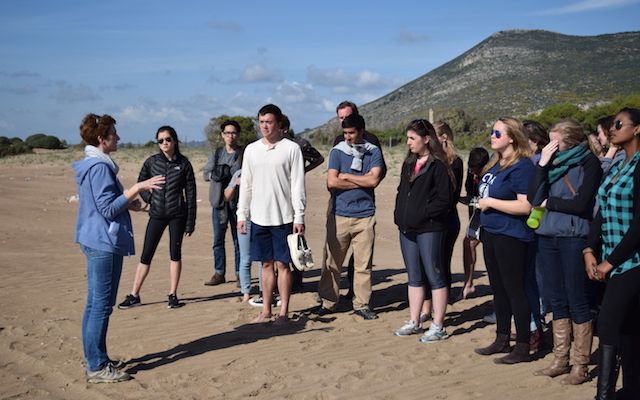
A world full of beauty
By PANAGIOTA MARAGOU*
One of the basic targets is to actually teach a different way of seeing and perceiving our surroundings. If we succeed, the natural environment stops being just a background to our everyday activities or scenery for our moments of relaxation.
A basic theme in our course is the observation and description of the natural world, with the study of organisms’ linkages to the environment – what they are, how and where they live, and the biotic and abiotic interactions that link them to communities and ecosystems- being central. It is multiscaled, from organisms to ecosystems and landscapes and cross- disciplinary as we illustrate the vital importance of natural history knowledge to many disciplines, basically conservation and management.
One of the basic targets is to actually teach a different way of seeing and perceiving our surroundings. If we succeed, the natural environment stops being just a background to our everyday activities or scenery for our moments of relaxation. Instead a complete world emerges, lively, changing, intriguing, and in an age of cynicism and gloom, full of beauty. The richness and complexity of the Mediterranean environment, foreign and unknown to most students, allow the combination of different aspects such as climate, geology, species, ecosystems, resources and policy into a full picture so that we illustrate to the students what natural processes are and should be. I think that this is why it could be important to students. They learn to perceive their natural environment in a different way that hopefully will eventually help them to better identify causes and effects and address current environmental challenges.
Natural history helps people, students included, to appreciate and hopefully love nature. I will never forget the shock of a student tasting a wild almond she had just picked from the tree … she was expecting just an almond but the richness of flavors of the wild food took her completely by surprise!
From my part, I realized that teaching greatly helps me to really learn, engage with and benefit from my experiences. It is a challenge to tell the story, make the connection with conservation needs and then bridge over to policies and things that need to be done.
* Panagiota Maragou is a biologist (National and Kapodistrian University of Athens) with a PhD from the University of Patras. Her dissertation discussed the comparative ecology of two endemic lizard species of the Peloponnese. Her main areas of interest lie within the conservation of Greek biodiversity; from the survey and monitoring of species, esp. reptiles, to impact assessment and the management of wildlife. Since 1997 she has been working at the World Wide Fund for Nature – Greece (WWF Greece) managing conservation projects, developing position papers, analyzing the information required to carry out advocacy work and organizing the dissemination of the conservation knowledge produced by WWF, other NGOs and the academia. She is the co-editor of the Greek Red Data Book of Threatened Fauna and the author of several peer reviewed scientific papers and other publications on the herpetofauna of Greece and general conservation issues.






